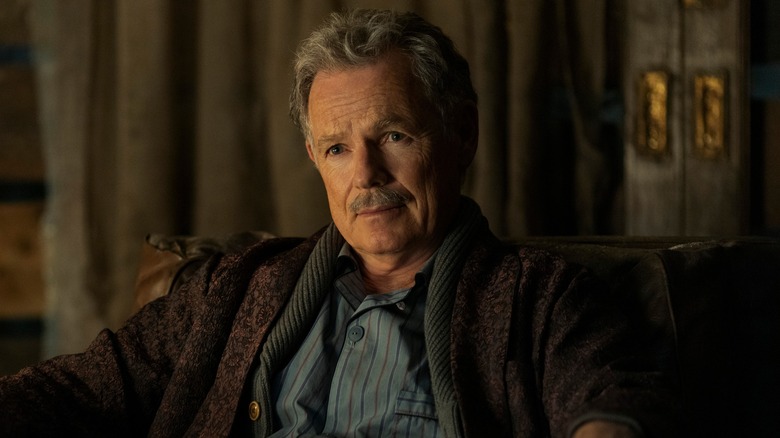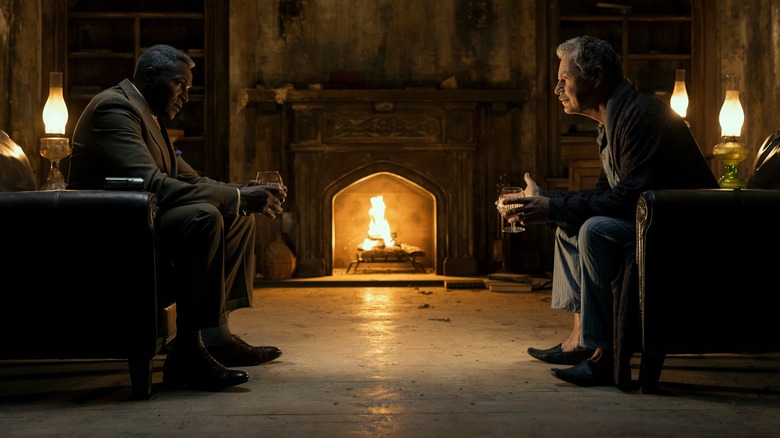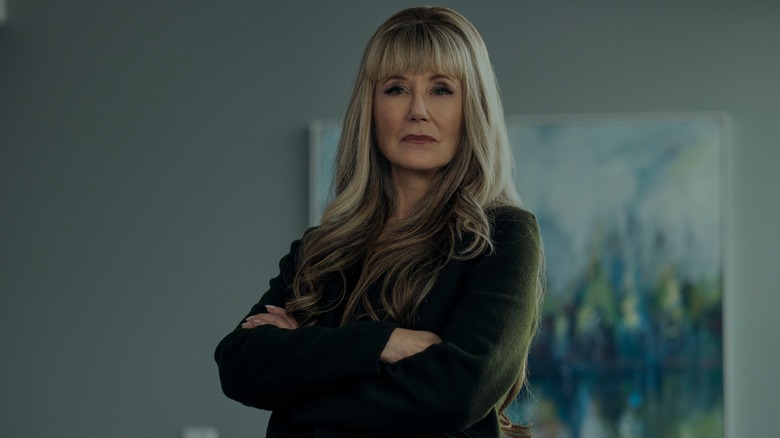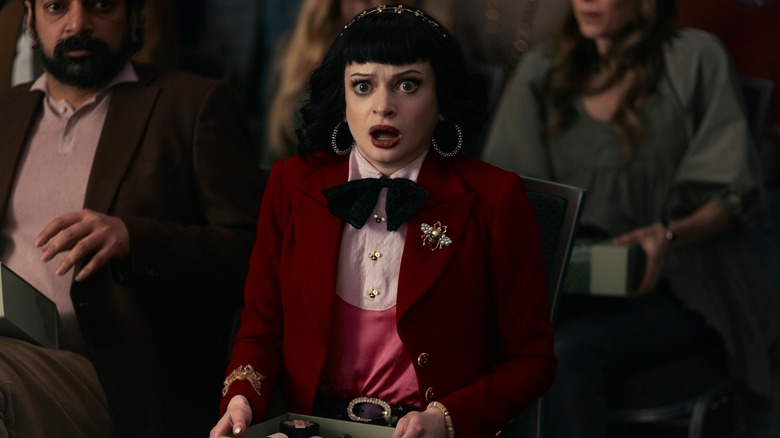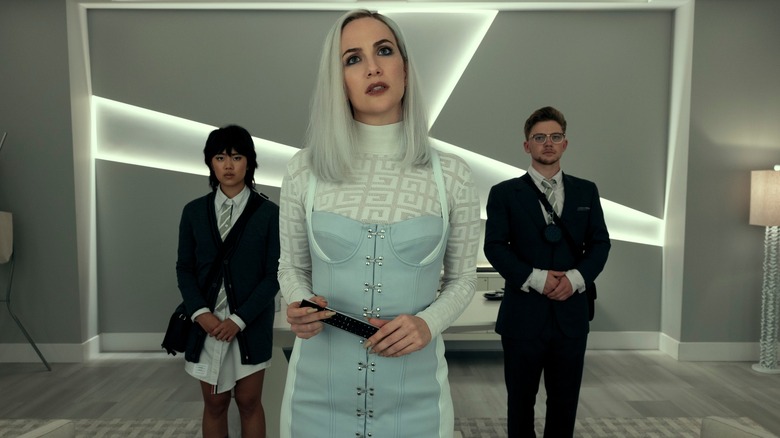5 Ways The Fall Of The House Of Usher Is Majorly Different From Poe's Story
Contains general spoilers for "The Fall of the House of Usher"
One of the most interesting elements of Mike Flanagan's "The Fall of the House of Usher" is how the Netflix miniseries manages to take a simple short story and turn it into a long, multi-faceted, multi-generational epic. To do that, naturally, it has to expand its point of view beyond the bounds of a single Edgar Allan Poe story and retell a whole bunch of the horror master's famous poems and short stories through a single family. Many details are pulled from a large variety of Poe's works, from ghostly cats to dangerous pendulums to masked parties that result in mass death and destruction.
Still, many elements from the original "The Fall of the House of Usher" remain in the miniseries. But there's a wide variety of plot elements which have been altered, or given to a different character in the narrative. There are definitely some notable changes made to the property thanks to that difference. From changing the tale's time period to adding fresh characters and even giving the short story's nameless narrator a personality, back story and goal, here are five differences between the short story and the miniseries it spawned.
The narrator does not have a name in the short story
One of the most interesting changes between the miniseries and the short story is that the narrator Edgar Allan Poe employs throughout "The Fall of the House of Usher" is given a name, backstory, and a different personality. In the short story, he is mainly there to explain the Usher family's history and Roderick's declined state and help him out when his twin sister, Madeline, meets what seems to be a permanent end. His personality is observant and nurturing; he tries to cheer Roderick out of his bouts of melancholy and his fits of anxiety and temperament. They are friends, but in the miniseries, the narrator character and Roderick Usher (Bruce Greenwood) are foes.
In the miniseries, the narrator's life takes the form of the character C. Auguste Dupin (Carl Lumbly), a federal prosecutor who's made it his life's mission to take Roderick down. He's the one responsible for representing the United States when Fortunato is sued by the government for its predatory drug practices. He and Roderick have known one another for years, but unlike Roderick, Dupin's good at his job, and he's succeeded in prioritizing his family and the power of good over wealth, greed, and selfishness. Dupin's the one to whom Roderick confesses the fateful truth of the bargain he and Madeline (Mary McDonnell) have crafted with Verna (Carla Gugino), and he's the one who watches the twins' final, deadly battle and the collapse and destruction of their old family home. Poe's version of the narrator lacks the power of foreknowledge of what will transpire thanks to knowing the truth behind the Ushers' story.
Madeline and Eliza's stories get tangled together
In Poe's short story, Roderick and Madeline's mother, Eliza (Annabeth Gish) is not an extent character. Instead, the siblings are the last of the Ushers, and they are dying slowly. Madeline is cataleptic and Roderick is slowly sinking from anxiety, grief, and fear. In the miniseries, Eliza is the cataleptic one, forever on the verge of death, swallowing up her children's meager funds and lying abed at home because she refuses proper medical treatment.
Eliza — as Madeline does in the short story — seems to die suddenly. The short story version of Roderick has his twin entombed in the family crypt, perhaps to ensure her death while knowing she's still alive, while Madeline and Roderick bury their mother in the backyard fully believing that she's no longer among the living. Both women are proven to have been pronounced dead before their time. Eliza, however, does not join the short story version of Madeline in her quest for violent revenge upon Roderick. Instead, she wanders across town to the home of her long-ago lover — the twins' father — and strangles him to death, finally expiring on top of his body.
The miniseries does use elements of Madeline's original death in the twins' duel demise, with Roderick entombing Madeline in the basement of their old house and a still-alive Madeline lurching, eyeless, to strangle him to death as the house comes down around their ears.
The house is not a living presence in the miniseries
Speaking of that infamous house, the short story version of "The Fall of the House of Usher" creates the literally-cracking-apart lake-surrounded home of the Usher family as a living, breathing presence within the narrative. Roderick swears that the very vegetation growing on the walls is directing his doom, and that the home is a breathing malevolent entity pushing him and his sister closer and closer to death. When Madeline and Roderick have a final confrontation, the rising blood moon shines through the cracked-in-half home and it tumbles apart and into the lake, wiping the Usher family from the face of the earth.
In the miniseries, the Ushers' old house is just that — an old house, which symbolically quakes and falls apart when Madeline and Roderick have their final confrontation. The rubble and their bodies are presumably not mashed into non-existence. The thing that breathes within it is the memories that are attached to it; no ghosts stalk the property, and there is no sense that the building is chasing the siblings with its menacing evil. All of the wickedness inherent in the falling-down place comes from either Roderick's guilt or his Verna-induced hallucinations. Verna herself isn't even bound to the domicile; when it falls apart, she perches triumphantly atop the rubble in the form of a crow, then appears one more time at the family's graveside before flying away.
The whole story takes place within the recent past and modern era
The Netflix take on "The Fall of the House of Usher" spans the course of many years — from the 1950s, when Roderick was a child, to the 2020s, where he meets an ignominious ending. This allows the miniseries to show us how Roderick became the cold-hearted billionaire whose seemingly miraculous painkiller proves to be a dangerous, life-destroying drug that only existed to benefit his family's coffers. It shows how the Usher family grows in the glowing light of their own maleficence, which eventually overwhelms them through their own personality flaws and sins.
The original story takes place within the span of roughly two weeks; the narrator arrives at the Usher's home and Madeline dies; he participates in her entombment and, eight days later, Madeline breaks free and wreaks havoc. Barely 10 days have passed since the narrator arrived at Roderick Usher's behest, and the incredibly brief span of time covers all of the major events that take place in the short story
It's also worth noting that the medieval comedy the narrator reads to Roderick in the story never appears in the Netflix narrative — perhaps to make more room for more Poe references and poem recitals.
All of the Usher family's children (and spouses) are an invention of the miniseries
If you find the extremely slim number of days in which the original story takes place surprising, just think of this — the original version of "The Fall of the House of Usher" only has three characters in it. Those lucky few are the narrator, Madeline, and Roderick; no one else exists in the tumbling-down lake house, and nobody else exists in these character's lives. The only other human beings referenced are fictional characters in the story the narrator reads to Roderick. It's quite a desolate story — not even a servant peeps their head around the corner to make a comment.
None of Roderick's children are characters in the story; Verna does not exist as a character within the short story at all. There is no Arthur Pymm (Mark Hamill) and no Annabel Lee (Katie Parker). All of these elements have been brought in from other Poe stories, poems, and even from his real life to broaden the narrative.
Is Edgar Allan Poe's fiction better than Mike Flanagan's? Viewers will find out when his highly critically acclaimed version of "The Fall of the House of Usher" hits Netflix on October 12.
